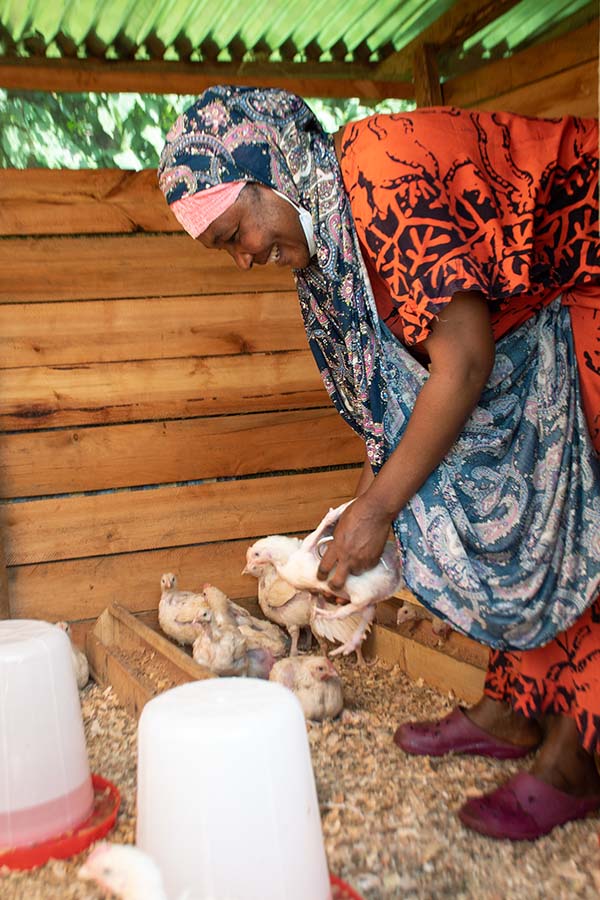
Raising Poultry and Sustainability in Cameroon
“Here is the update on the chicks’ health and care schedule,” Yaya Aishatou says, as she hands a sheet of paper to Cho Bertrand Penn, a community animal health worker designated by Catholic Relief Services to support her community.
Cho Bertrand visits Yaya and other poultry program participants in her village as part of his regular poultry checkups. He examines chicks, ensuring that they are growing well and staying warm on cold nights in the northwest region of Cameroon.

Yaya demonstrates how she cares for her chickens after learning hygiene practices and techniques to feed and hydrate the chicks. Photo by Louis Blaise Djilo for CRS
“These chicks are growing very well,” Cho Bertrand says.
“I check the coop first thing in the morning and late in the evening to clean and feed the chicks,” Yaya says. “These chicks will soon help me provide for my family.”
Yaya fled 25 miles to the village of Santa with her large family of 16 when a conflict escalated between non-state armed groups and government forces in the northwest. A mother and grandmother, Yaya provides for her eight children and seven grandchildren who currently live with her.
When Yaya moved to Santa, she found greater security and a welcoming community for her family. In spring 2022, she also learned about the Anglophone Crisis Emergency Response III Project, or ACER III, from a community leader in Santa. Funded by the U.S. Agency for International Development’s Bureau for Humanitarian Assistance, ACER III is a one-year project implemented by CRS and the Archdiocese of Bamenda in the Northwest Region of Cameroon.
Through ACER III, Yaya receives credit on an electronic card that she uses to purchase nutrient-rich food items and critical household supplies from vendors in the local market. Using the funds, she has purchased beans, groundnuts, fish, meat and rice as well as extra mattresses and buckets for her children and grandchildren.
Yaya is also one of 60 participants engaged in the ACER III livelihoods pilot, which helps households develop small businesses that raise and sell chickens, as a more sustainable way for vulnerable displaced and host families to cover their basic needs in the long term.
Yaya’s household was a perfect addition to the pilot. She was eager to learn and care for the chicks, had adequate space for poultry production at her home, and had sufficient funds to also invest in some of the costs of the business that were not covered by the project.
Through the pilot, Yaya participated in a two-day poultry training to learn how to care for her chicks during the fattening process. She also attended a four-day business training to learn key business skills, such as understanding supply and demand, managing cash flow, calculating revenues, profits, and loss, and improving sales through marketing. To start her business, Yaya received 43 chicks, a chicken coop and other key supplies from the project. She also hosted regular visits from ACER III staff, including Cho Bertrand, who supported her throughout the process.
Thanks to this training and ACER III staff support, all 43 chicks survived till they were fully grown and could be sold. Yaya sold her chickens in Santa’s market for approximately $345. Following the sale, Yaya decided to reinvest in her poultry production business using all proceeds from her chicken sales. She bought 45 more chicks and enough feed for the chicks to grow and be ready to sell in roughly one month.
Yaya says that ACER III and the poultry pilot gave her hope for a better future for her children and grandchildren.
“I raise chickens so that I can save enough money to pay for my children’s education and cover their medical bills,” she says. While she will no longer be a participant in ACER’s next cohort, as participants are required to graduate after 12 months of assistance, she use her new knowledge, skills, and profit to provide sustainably for her household.
“I’m happy—very grateful. This program has changed my life.”
Funded by the U.S. Agency for International Development’s Bureau for Humanitarian Assistance, the Anglophone Crisis Emergency Response III project responds to the basic needs of more than 12,500 individuals from vulnerable Internally Displaced Persons and host families in 24 communities affected by the ongoing crisis in Cameroon’s English-speaking regions. In the one-year project, households receive six rounds of monthly food assistance and a one-time credit to purchase household supplies. Sixty households also received training and support to launch poultry-raising businesses to help them become more self-sufficient. Over the past four years, CRS and the Archdiocese of Bamenda have provided emergency assistance to nearly 90,000 people in the Northwest thanks to funds from USAID/BHA.

